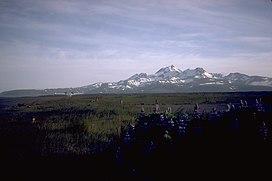Frosty Peak Volcano, also known as Mt. Frosty, Frosty Volcano, or Cold Bay Volcano, is a 6,299 ft (1,920 m) stratovolcano at the southwest end of the Alaska Peninsula in the U.S. state of Alaska.[1][2]
| Frosty Peak Volcano | |
|---|---|
 Frosty Peak Volcano, a stratovolcano at the southwest end of the Alaska Peninsula | |
| Highest point | |
| Elevation | 6,299 ft (1,920 m) |
| Prominence | 6,772 ft (2,064 m) |
| Listing | Mountain peaks of Alaska |
| Coordinates | 55°04′02″N 162°50′07″W / 55.0673°N 162.8354°W |
| Geography | |
 | |
| Location | Alaska Peninsula, Alaska, U.S. |
| Parent range | Aleutian Range |
| Topo map | USGS McCarthy B-2 |
| Geology | |
| Mountain type | Stratovolcano |
| Volcanic arc | Aleutian Arc |
| Last eruption | Unknown - Pleistocene or later |

History
editFrosty Peak is the tallest and most recently formed peak of the volcanic complex.[3] Its exact age is unknown, but it was probably formed in the middle to late Pleistocene, and possibly erupted even more recently. Frosty Peak is the southern cone of the double-coned Frosty Volcano, which formed in the middle Pleistocene some time before the Wisconsin Glaciation.[4]
Frosty Volcano itself is located on the northern flank of an even older volcano, the Morzhovoi Volcano.[5] Morzhovoi Volcano was probably formed in the early to middle Pleistocene, and collapsed into a caldera. The highest points that remain from the caldera are called North and South Walrus Peak.[6]
See also
editReferences
edit- ^ "Frosty - Introduction". www.avo.alaska.edu. Retrieved 2018-06-10.
- ^ "Frosty Peak | Volcano World | Oregon State University". volcano.oregonstate.edu. Retrieved 2018-06-10.
- ^ "Frosty". Global Volcanism Program. Smithsonian Institution. Retrieved 2021-06-27.
- ^ Waldron, Harold (1961). "USGS Bulletin 1028-T - Geologic Reconnaissance of Frosty Peak Volcano and Vicinity, Alaska" (PDF).
- ^ "Morzhovoi - Introduction". www.avo.alaska.edu. Retrieved 2018-06-10.
- ^ Geological Survey Bulletin. U.S. Department of the Interior, Geological Survey; Washington, D.C. 1961.
External links
edit- Siebert L, Simkin T (2002–present). Volcanoes of the World: an Illustrated Catalog of Holocene Volcanoes and their Eruptions. Smithsonian Institution, Global Volcanism Program Digital Information Series, GVP-3 (http://www.volcano.si.edu).
- Volcanoes of the Alaska Peninsula and Aleutian Islands-Selected Photographs
- Alaska Volcano Observatory Archived 2012-11-20 at the Wayback Machine